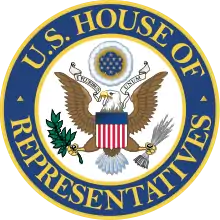Democratic Congressional Campaign Committee
The Democratic Congressional Campaign Committee (DCCC, sometimes spoken of as "D triple-C" or "D-trip") is the Democratic Hill committee for the United States House of Representatives, working to elect Democrats to that body.[1] The DCCC recruits candidates, raises funds, and organizes races in districts that are expected to yield politically notable or close elections. The structure of the committee consists, essentially, of the Chairperson (who according to current Democratic Caucus rules is a fellow member of the Caucus appointed by the party leader in the House), their staff, and other Democratic members of Congress that serve in roles supporting the functions of the committee.
 | |
| Founded | 1866 |
|---|---|
| Purpose | To elect Democrats to the United States House of Representatives |
| Location |
|
Chair | Sean Patrick Maloney |
| Website | https://dccc.org |
The Chairperson of the DCCC is the fifth-ranking position among House Democrats, after the Majority Leader, the Majority Whip, the House Assistant Democratic Leader, and the Democratic Caucus Chairperson. The current chair is Sean Patrick Maloney of New York, who assumed the position in 2021, after incumbent Cheri Bustos didn't run after a disappointing showing for Democrats in the 2020 Campaign Cycle.[2]
History
| This article is part of a series on the |
| United States House of Representatives |
|---|
 Great Seal of the United States House of Representatives |
|
History of the United States House of Representatives |
| Members |
|
|
| Politics and procedure |
| Places |
The DCCC originated in 1866 as the Democratic National Congressional Committee.
Due to the reform of campaign finance legislation that took effect in the 2004 election cycle, the DCCC splits into two organizations a few months before each Election Day:
- One organization (the "Coordinated" campaign) can continue to stay in contact with the individual congressional campaigns, offering advice and suggestions to candidates and their staffs in each race.
- The other organization (the "Independent Expenditure" campaign), which makes independent expenditures in congressional districts on behalf of the campaigns, is not allowed to coordinate activities with the campaigns.
In recent elections, the DCCC has played an expansive role in supporting Democratic candidates with independently produced television ads and mail pieces.
Rahm Emanuel assumed the position of DCCC committee chair after the death of the previous chair, Bob Matsui, at the end of the 2004 election cycle. Emanuel led the Democratic Party's successful effort to capture the majority in the House of Representatives in the 2006 elections. After Emanuel's election as chair of the Democratic Caucus, Chris Van Hollen became committee chair for the 110th Congress and the 2008 elections. He continued through the 2010 elections. For the 2014 election cycle, Democratic Minority Leader Nancy Pelosi appointed congressman Ben Ray Luján to serve as the committee's chair.
Alleged Russian hacking
In July 2016, the DCCC said it was hacked.[3][4][5][6][7] Subsequently, a person described as a hacker and known as "Guccifer 2.0" (Russian Main Intelligence Directorate persona) reportedly released documents and information that were obtained from the cyberattack on the DCCC.[8]
List of chairs
See also
References
- Bowden, John (March 30, 2019). "Progressives hammer DCCC over blacklist targeting primary challenges". The Hill.
- Marans, Daniel (3 December 2020). "Rep. Sean Patrick Maloney Elected To Run House Democrats' Campaign Arm". www.huffpost.com. Retrieved 3 December 2020.
- Neidig, Harper (29 July 2016). "House Dem campaign arm says it was hacked". The Hill. Retrieved 3 August 2016.
- "Exclusive: FBI probes hacking of Democratic congressional group - sources". Reuters. 29 July 2016. Retrieved 3 August 2016 – via Reuters.
- "Fundraising Nonprofit Says It Wasn't Compromised In DCCC Hack". Talking Points Memo. Retrieved 3 August 2016.
- "Democratic Party's congressional fundraising committee was also hacked". Ars Technica. Retrieved 3 August 2016.
- King, Bob; Starks, Tim (2016-07-28). "Hackers suspected in new attack on Democrats". Politico.Com. Retrieved 2016-08-13.
- Diaz, Daniella (2016-08-13). "Hacker releases cell phone numbers, personal emails of House Democrats". CNN. Retrieved 2016-08-13.